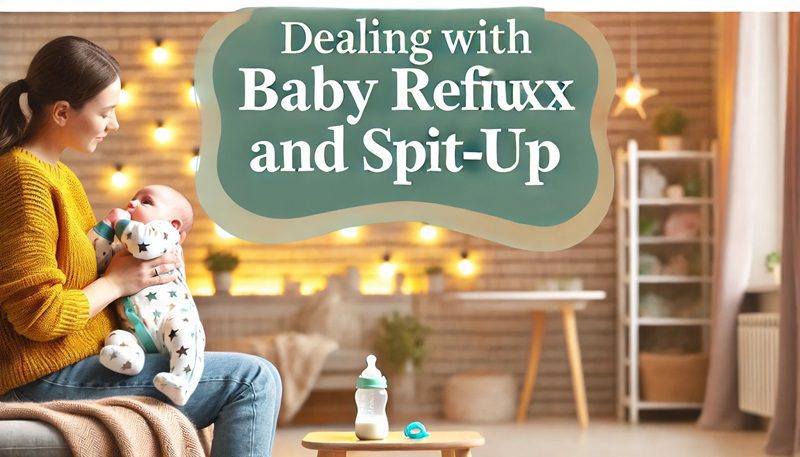Table of Contents
Baby Reflux and Spit-Up
Baby reflux and spit-up are common concerns for many parents, especially during the first few months. Although it can be distressing to see your baby spitting up frequently, it’s often a normal part of their development. Understanding what causes reflux and how to manage it can help ease your worries. In this article, we’ll share valuable tips, hacks, and suggestions for managing baby reflux and spit-up. We’ll also highlight some of our store’s top products to support you through this phase.
Dealing with baby reflux and spit-up can be challenging for many parents, but it’s important to understand that this is often a normal part of a baby’s development. If you’re looking for more in-depth information on this topic, check out this comprehensive guide on infant reflux symptoms and causes from the Mayo Clinic, one of the most authoritative sources for medical advice. Understanding the underlying factors can help you manage your baby’s condition more effectively, ensuring their comfort and health.
Spitting Up in Babies: What’s Normal, What’s Not?
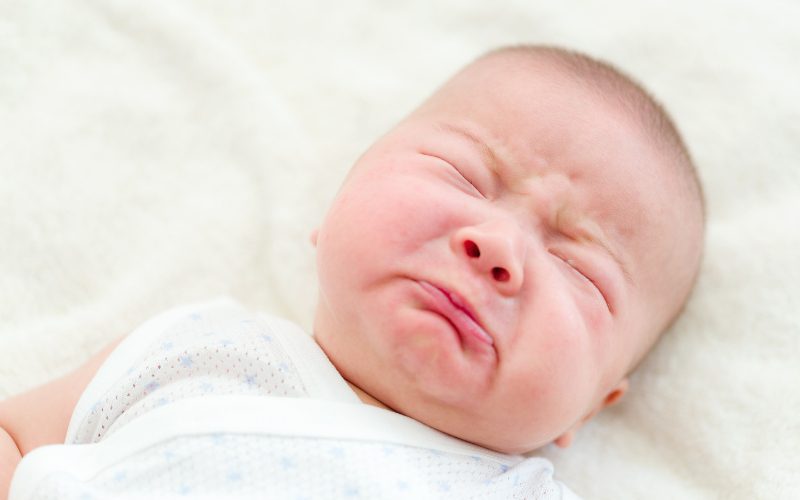
It’s important to distinguish between normal spit-up and something more concerning. Spitting up in babies: What’s normal, what’s not? Most babies will spit up occasionally, especially after feedings. This occurs because babies’ digestive systems are still maturing. The muscle that keeps food in the stomach, known as the lower esophageal sphincter, may not be fully developed yet. As a result, milk can easily come back up.
Signs That Spit-Up is Normal:
- Your baby seems happy and comfortable, despite the spit-up.
- The spit-up is usually small amounts and happens right after feeding.
- Your baby continues to gain weight at a healthy pace.
If your baby meets these criteria, there’s usually no cause for concern. However, if your baby is spitting up large amounts frequently, seems uncomfortable or fussy during or after feedings, or isn’t gaining weight as expected, it may indicate a more serious issue such as gastroesophageal reflux disease (GERD). GERD is a condition where stomach acid flows back into the esophagus, causing discomfort or complications in some cases.
If you suspect your baby might have GERD, it’s best to consult with a healthcare provider for a proper diagnosis and management plan.
To help manage normal spit-up, you can use practical items like our Waterproof Baby Bibs to keep your baby’s clothes clean and our Spit-Up Cloths for easy cleanups. These products are lifesavers for managing the daily spit-up messes efficiently and can make the clean-up process less stressful.
Sleep deprivation is one of the most challenging aspects of early parenthood, especially when dealing with issues like baby reflux and spit-up, which can interrupt your baby’s sleep patterns and your own rest. Understanding How to Deal With Sleep Deprivation After Baby can make a big difference in your well-being and ability to manage daily tasks. By establishing a consistent bedtime routine and exploring methods to ease your baby’s discomfort from reflux, you’ll be better equipped to get the sleep you need, even during these demanding times.
Why Babies Spit Up: Understanding the Causes
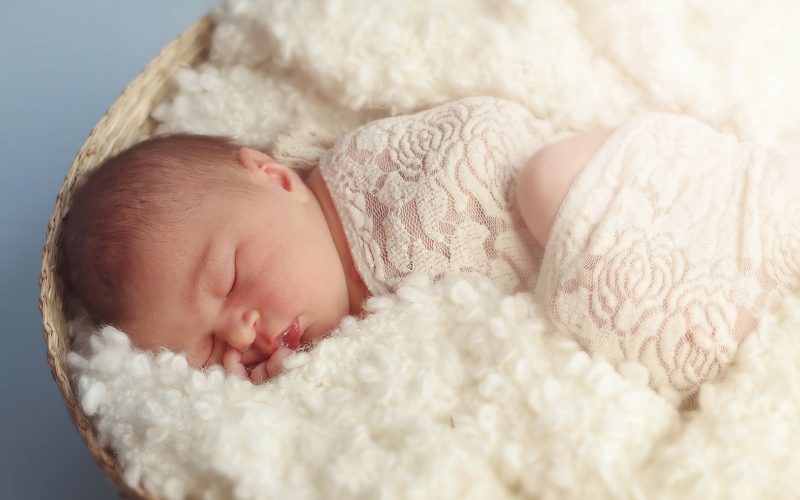
So, why do babies spit up? There are several common causes for baby reflux and spit-up. While it can be a regular part of development, understanding the reasons behind it can help you reduce its frequency.
Overfeeding: Feeding your baby too much milk at once can overwhelm their small stomachs, causing milk to come back up. Babies often don’t know when to stop, especially if they’re bottle-fed, which can result in overfeeding.
Swallowing air: Swallowing air can happen during feeding, especially while bottle-feeding. When babies swallow air, their stomachs can become bloated. This bloating often leads to spit-up. It can also occur if your baby has a poor latch while breastfeeding. A poor latch may cause them to ingest air along with their milk.
Immature digestive system: As mentioned earlier, babies have developing digestive systems, and their stomachs are still learning how to function properly. The muscle that keeps food down in the stomach (lower esophageal sphincter) may not be fully developed in newborns, making it easier for milk to travel back up the esophagus.
Tips to Reduce Spit-Up:
- Feed in an upright position: Keeping your baby upright during feedings and for 20-30 minutes after can help gravity keep the milk down.
- Avoid overfeeding: Give your baby smaller, more frequent feedings instead of large amounts at once.
- Burp your baby often: Regular burping during and after feedings helps release the air they may have swallowed, reducing the chance of spit-up.
- Use anti-colic bottles: If bottle-feeding, anti-colic bottles are designed to reduce the amount of air your baby swallows, which can significantly cut down on spit-up incidents.
Our store offers Baby Bottles, which can be a game-changer for parents dealing with frequent spit-up. These bottles are specially designed to minimize the air your baby swallows during feedings, reducing discomfort and spit-up.
Treating Reflux in Babies: Spitting Up, Crying, Breathing
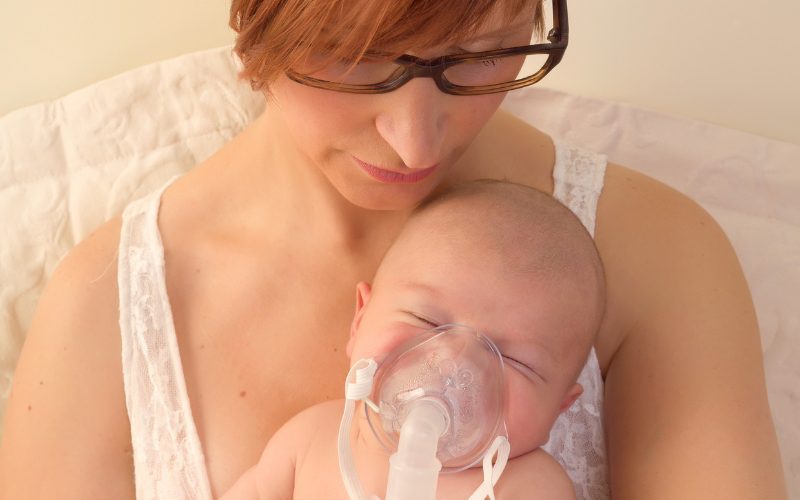
While normal spit-up isn’t usually a cause for concern, there are times when reflux may be more severe and require special attention. Treating reflux in babies: Spitting up, crying, breathing issues can arise if your baby has GERD or severe reflux. Unlike normal spit-up, GERD may cause discomfort, pain, and other symptoms that need to be addressed by a healthcare provider.
Symptoms of More Serious Reflux Include:
- Frequent, forceful vomiting (as opposed to regular spit-up).
- Crying or showing signs of discomfort during or after feeding.
- Trouble breathing or choking after spitting up.
If your baby experiences any of these symptoms, it’s essential to seek medical advice to determine whether more serious reflux is at play. In some cases, medications or specific treatments may be necessary to manage GERD and alleviate discomfort.
In the meantime, using the right products can make your baby more comfortable. Our Reflux Wedge Pillow is designed to keep your baby elevated during and after feedings, reducing the likelihood of reflux. Elevating your baby’s head slightly can help prevent milk from coming back up and make them more comfortable, especially during sleep.
Managing Diaper Blowouts and Leaks
Diaper blowouts and leaks can be just as common as baby reflux, often causing messy situations for both parents and little ones. To help minimize diaper blowouts, it’s essential to ensure a snug fit around the waist and legs, and to choose diapers designed to handle extra absorbency. Consider using high-quality diapers with stretchy side panels and elastic waistbands that prevent leaks without being too tight for your baby’s comfort. Additionally, investing in diaper covers or liners can offer an extra layer of protection, especially during naps or overnight. For parents on the go, keeping extra changing mats handy can make cleanup much easier while helping your baby stay comfortable.
Practical Steps for Managing Reflux

Managing reflux in babies can be challenging, but there are several practical steps you can take to reduce spit-up and keep your baby comfortable:
Burp your baby frequently: As mentioned earlier, burping your baby multiple times during feeding helps release any swallowed air, which can reduce the chances of spit-up. Try to burp them every few minutes during feeding and immediately after.
Use a reflux wedge pillow: Keeping your baby’s head elevated during feedings and while sleeping can help prevent reflux. This simple adjustment can make a big difference, particularly for babies who spit up more frequently.
Smaller, more frequent feedings: Overfeeding can make reflux worse. Instead of giving your baby a full bottle or long breastfeeding session, try giving them smaller amounts more frequently. This helps prevent their stomach from getting too full and reduces the likelihood of milk coming back up.
By incorporating these practical steps and using the right products, you can effectively manage your baby’s reflux, making the experience less stressful for both you and your little one.
When dealing with baby reflux and spit-up, it’s essential to keep an eye on your little one’s overall health and any other concerning symptoms. For example, some newborns may experience jaundice, a common condition where the skin and eyes turn yellow due to elevated bilirubin levels. Understanding Jaundice in Newborns – Symptoms, Causes, and Treatment can help parents address this condition early and ensure their baby gets the care they need.
Spitting Up in Babies: What’s Normal, What’s Not? Recap
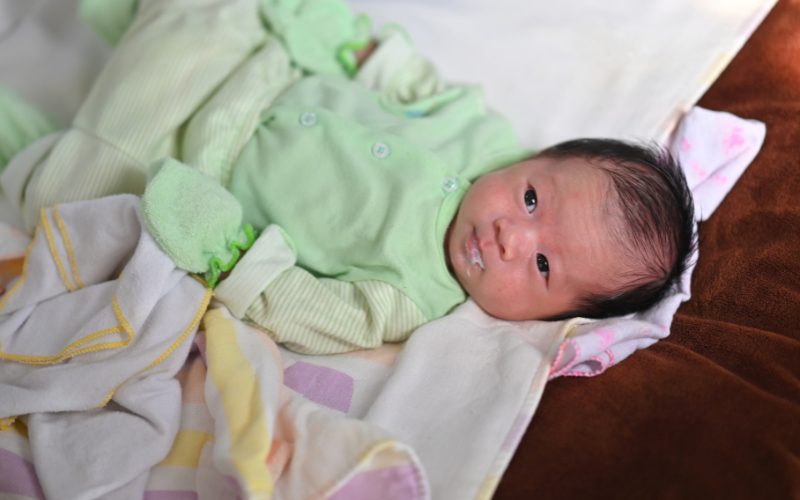
In summary, spitting up in babies is a common and often normal part of their early development. Spitting up in babies: What’s normal, what’s not is a question many parents ask, and as long as your baby seems happy, gains weight steadily, and doesn’t show signs of distress, occasional spit-up is likely nothing to worry about. However, if your baby seems uncomfortable, is not gaining weight, or exhibits signs of GERD, it’s important to seek medical advice.
At our store, we offer a variety of products to help make managing baby reflux and spit-up easier. From the Waterproof Baby Bibs to the Reflux Wedge Pillow, these items are designed to make your life as a parent simpler and keep your baby as comfortable as possible.
Conclusion
Dealing with baby reflux and spit-up is a common challenge in early parenthood. However, with the right strategies and products, you can manage it confidently. Understanding the causes of spit-up and reflux is essential. It’s also important to know when to seek further treatment. By using products designed for baby comfort and cleanliness, you can reduce the stress these incidents cause.
Treating reflux in babies: Spitting up, crying, breathing complications can often be managed with practical tools like our Reflux Wedge Pillow or anti-colic bottles. Remember, while spit-up can be a regular occurrence, it’s important to monitor your baby’s behavior and overall health to ensure they are thriving.
For more tools to help manage spit-up and reflux, be sure to explore our range of products like Waterproof Baby Bibs, Spit-Up Cloths, and the Reflux Wedge Pillow to make your baby’s (and your) life a little easier during this phase.
When it comes to traveling with a baby, preparation is key. Whether you’re embarking on a short road trip or a long-haul flight, having the right gear can make all the difference. From lightweight strollers and compact travel cribs to diaper bags that keep essentials organized, choosing the right equipment ensures a smooth journey for both you and your little one. Don’t forget to include baby-friendly items like portable bottle warmers and comfortable baby carriers for added convenience on the go. For more tips, check out our full guide on How to travel with a baby, and the gear you need to make your trip stress-free.

